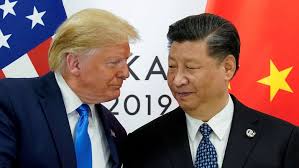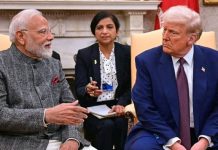China has retaliated against President Donald Trump’s tariffs by implementing some of its own, renewing a trade war between the world’s top two economies.
The measures, announced by China’s Finance Ministry, levy a 15 per cent duty on certain types of coal and liquefied natural gas and a 10 per cent tariff on crude oil, agricultural machinery, large-displacement cars and pickup trucks.
The country has separately imposed export controls on several elements critical to the production of modern high-tech products.
Many of the impacted minerals are essential to US economic or national security and have supply chains vulnerable to disruption.
China’s Commerce Ministry placed two American companies on an unreliable entities list, including the parent company of popular fashion brands Calvin Klein and Tommy Hilfiger, barring the firms from engaging in China-related import or export activities and from making new investments in the country.
Beijing will further probe Google for alleged anti-trust violations, according to a statement from the State Administration for Market Regulation, though the specifics of the probe remain unclear.
The tariffs would go into effect next Monday, but were announced the same day Trump implemented his 10 per cent tariffs on all Chinese imports to the US.
The move came as Trump secured border protection agreements from both Canada and Mexico following a whirlwind day that began with a cratering stock market and the threat of a trade war.

Yet there was no such reprieve for China, and a White House spokesperson said Trump would not be speaking with Chinese President Xi Jinping until later in the week.
The slew of measures announced Tuesday cut across different sectors of the economy, from energy to individual US companies.
Although China and the US have engaged in a tit-for-tat trade war before, analysts warn that this time around China is much better prepared to counter.
‘They have a much more developed export control regime. We depend on them for a lot of critical minerals: gallium, germanium, graphite, a host of others’ said Philip Luck, a former State Department official and director at the Center for Strategic and International Studies. ‘So – they could put some significant harm on our economy.’
American consumers and businesses will likely face higher prices on electronics, shoes and a slew of other products, experts warn.












